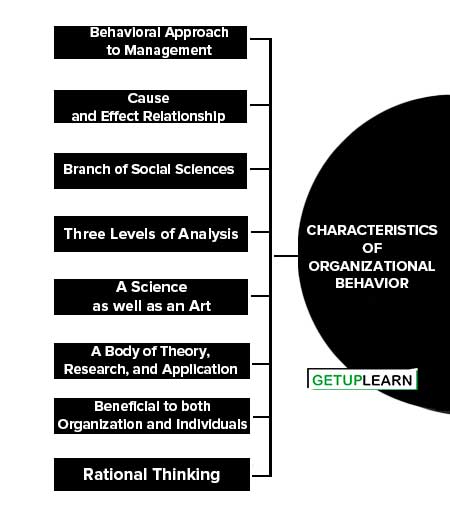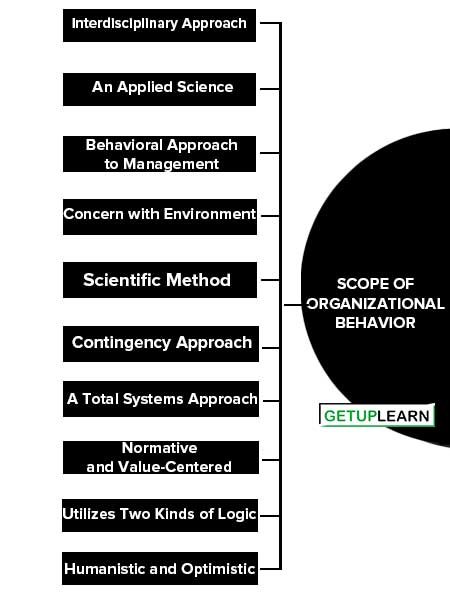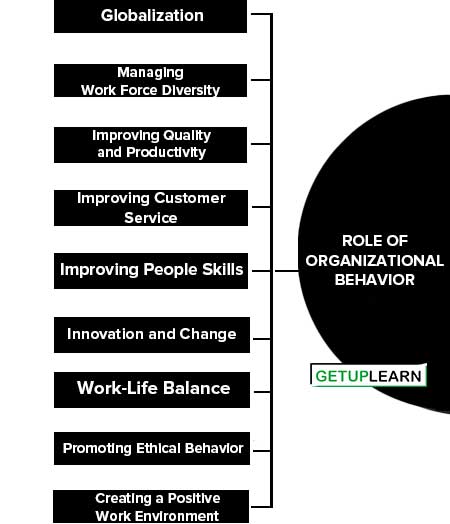Table of Contents
- 1 What is Organizational Behavior?
- 2 Definition of Organizational Behavior
- 3 Characteristics of Organizational Behavior
- 4 Scope of Organizational Behavior
- 5 Role of Organizational Behavior
-
6 FAQs About Organizational Behavior
- 6.1 What is the meaning of organizational behavior?
- 6.2 What is the best definition of organizational behavior?
- 6.3 What is the simple definition of organizational behavior?
- 6.4 What are the characteristics of organizational behavior?
- 6.5 What is the scope of organizational behavior?
- 6.6 What is the role of organizational behavior?
What is Organizational Behavior?
Organizational Behavior is concerned with the study of the behavior of people working in an organization. It involves the understanding, predicting, and controlling of human behavior and the factors Which influence the performance of these people.
Organizational behavior (OB) is a field of study that investigates the impact that individuals, groups, and structures have on behavior within an organization, then applies that knowledge to make organizations work more effectively (Robbins, 2003).
In recent times, we notice the following changes in the organizational setup:
- The demise of traditional hierarchical structure,
- The emergence of a workforce with different expectations from organizations,
- Advancement of information technology,
- Increasing importance on empowerment and teamwork,
- Concern for work-life balance
Definition of Organizational Behavior
These are the definitions of organizational behavior given by economists:
“OB is a branch of the social systems that seeks to build theories that can be applied to predicting, understanding, and controlling behavior in work organizations.”
Aldag and Brief
“Organizational behavior as a systematic study of the actions and attitudes that people exhibit within organizations.”
Stephen P Robbins
“Organizational behavior is a subset of management activities concerned with understanding, predicting and influencing individual behavior in organizational setting.”
Callahan, Fleenor and Kudson
“Organizational behavior is the study and application of knowledge about how people act within an organization. It is a human tool for human benefit. It applies broadly to the behavior of people in all types of organization.”
Newstrom and Davis
“Organizational behavior is directly concerned with the understanding, production and control of human behavior in organizations.”
Fred Luthans
Characteristics of Organizational Behavior
From the above definitions, the following characteristics or features of organizational behavior emerge:
- Behavioral Approach to Management
- Cause and Effect Relationship
- Branch of Social Sciences
- Three Levels of Analysis
- A Science as well as an Art
- A Body of Theory, Research, and Application
- Beneficial to both Organization and Individuals
- Rational Thinking

Behavioral Approach to Management
Organizational behavior is that part of the whole management that represents the behavioral approach to management. Organizational behavior has emerged as a distinct field of study because of the importance of human behavior in organizations.
Cause and Effect Relationship
Human behavior is generally taken in terms of cause-and-effect relationships and not in philosophical terms. It helps in predicting the behavior of individuals. It provides generalizations that managers can use to anticipate the effect of certain activities on human behavior.
Organizational Behavior is a Branch of Social Sciences: Organizational behavior is heavily influenced by several other social sciences viz. psychology, sociology, and anthropology. It draws a rich array of research from these disciplines.
Three Levels of Analysis
Organizational behavior encompasses the study of three levels of analysis namely individual behavior, inter-individual behavior, and the behavior of organizations themselves. The field of organizational behavior embraces all these levels as being complementary to each other.
A Science as well as an Art
Organizational behavior is a science as well as an art. Systematic knowledge about human behavior is a science and the application of behavioral knowledge and skills is an art.
Organizational behavior is not an exact science because it cannot exactly predict the behavior of people in organizations. At best a manager can generalize to a limited extent and in many cases, he has to act on the basis of partial information.
A Body of Theory, Research, and Application
Organizational behavior consists of a body of theory, research, and application that helps in understanding human behavior in an organization. All these techniques help managers to solve human problems in organizations.
Beneficial to both Organization and Individuals
Organizational behavior creates an atmosphere whereby both organizations and individuals benefit from each other. A reasonable climate is created so that employees may get much-needed satisfaction and the organization may attain its objectives.
Rational Thinking
Organizational behavior provides rational thinking about people and their behavior. The major objective of organizational behavior is to explain and predict human behavior in organizations so that result-yielding situations can be created.
Scope of Organizational Behavior
The study and application of knowledge about human behavior related to other elements of an organization such as structure, technology, and social systems. On the basis of the definitions stated and various other definitions, we can draw the following conclusions related to the nature and scope of Organizational Behavior:
- Interdisciplinary Approach
- An Applied Science
- Behavioral Approach to Management
- Concern with Environment
- Scientific Method
- Contingency Approach
- A Total Systems Approach
- Normative and Value-Centered
- Utilizes Two Kinds of Logic
- Humanistic and Optimistic

Interdisciplinary Approach
Organizational Behavior integrates knowledge from various relevant disciplines. OB draws heavily from psychology, sociology, and anthropology. Besides it also takes relevant things from economics, political science, law, and history. These disciplines exist separately, but OB integrates the relevant contents of these disciplines.
An Applied Science
Organizational Behavior is oriented toward understanding the forces that affect behavior so that their effects may be predicted and guided toward the effective functioning of the organization. The basic goal of OB is to make applications of various researchers to solve organizational problems particularly related to human behavior aspect.
Behavioral Approach to Management
Organizational Behavior is directly connected with the human side of management, but it is not the whole of management. Organizational Behavior is related to the conceptual and human dimensions of management.
Concern with Environment
Organizational Behavior is concerned with issues like compatibility with the environment e.g. person-culture fit, cross-cultural management, etc.
Scientific Method
Organizational Behavior follows the scientific method and makes use of logical theory in its investigation and in answering the research questions. It is an empirical, interpretive, critical, and creative science.
Contingency Approach
There are very few absolutes in Organizational Behavior. The approach is directed towards developing managerial actions that are most appropriate for a specific situation.
A Total Systems Approach
Organizational Behavior is a systematic vision as it takes into account all the variables affecting organizational functioning.
The systems approach is an integrative approach that takes into account all the variables affecting organizational functioning. Man’s nature is quite complex and OB by applying a systems approach tries to find the solution to this complexity.
Normative and Value-Centered
Organizational Behavior is a value-centered science. A normative science, unlike positive science, suggests only cause-effect relationships and prescribes how the various findings of the research can be applied to get organizational results that are acceptable to society.
Utilizes Two Kinds of Logic
It utilizes both objective and subjective logic. Objectivity is concerned with reaching a fact through empirical analyses. Subjectivity is concerned with deciding about an issue through intuition, common sense, experiences, gut feeling, metaphors, learning from stories and cases, persuasive literature, etc.
Humanistic and Optimistic
OB focuses the attention on people from a humanistic point of view. It is based on the belief that the needs and motivations of people are of high concern. Further, there is optimism about the innate potential of man to be independent, creative, productive, and capable of contributing positively to the objectives of the organization.
Role of Organizational Behavior
Organizational behavior provides solutions as well as insight into solutions to many challenges that are faced by organizations. Some of the important roles performed by organizational behavior in the management of the business are as follows:
- Globalization
- Managing Work Force Diversity
- Improving Quality and Productivity
- Improving Customer Service
- Improving People Skills
- Innovation and Change
- Work-Life Balance
- Promoting Ethical Behavior
- Creating a Positive Work Environment

Globalization
Due to globalization, organizations are no longer confined to one particular country. The Manager’s job is changing with the expansion of the organizations across national borders.
For example, Volkswagen builds its cars in Mexico, Mercedes, and BMW in South Africa. Due to globalization, management has to deal with the problems of unfamiliar languages, laws, work ethics, management styles, etc.
Managing Work Force Diversity
Organizations are a heterogeneous mix of people in terms of age, gender, race, etc. Managers have to deal with individuals and groups belonging to different ethnic cultures with workforce diversity by promoting awareness, increasing diversity skills, and encouraging cultural and gender diversity.
Improving Quality and Productivity
Every Manager is confronting the same problem of improving the productivity, and quality of the goods and services their organization is providing. Organizational Behavior helps Managers to empower their employees, as they are the major forces for implementing this change.
Improving Customer Service
Most of the employees work in the service sector. The jobs in the service sector are very demanding. It requires continuous interaction with the organization’s clients i.e. the customers. Organizational Behavior helps managers to improve customer service and organizational performance.
Improving People Skills
Organizational Behavior helps in better management of the business as it helps in improving the skills of the people. It provides insight into the skills that the employees can use on the job such as designing jobs and creating effective teams.
Innovation and Change
Organizational Behavior helps in stimulating innovation and change. Employees can either be a hurdle or an instrument of change. It is organizational behavior that fosters ideas and techniques to promote innovation and change by improving employees’ creativity.
Work-Life Balance
Organizations that do not help employees achieve work-life balance will not be able to retain their most talented employees. Organizational behavior helps in designing flexible jobs which can help employees deal with work-life balance issues.
Promoting Ethical Behavior
Sometimes organizations are in a situation of ethical dilemma where they have to define right and wrong. It is Organizational Behavior plays an important role by helping the management to create a work environment that is ethically healthy and increases work productivity, job satisfaction, and organizational citizenship behavior.
Creating a Positive Work Environment
Organizational behavior helps in creating a positive work environment in today’s where competitive pressures are stronger than before. OB helps to develop resilience and human strength, and it fosters vitality.
FAQs About Organizational Behavior
What is the meaning of organizational behavior?
“Organizational behavior is the study and application of knowledge about how people act within an organization. It is a human tool for human benefit. It applies broadly to the behavior of people in all types of organization.”
What is the best definition of organizational behavior?
“OB is a branch of the social systems that seek to build theories that can be applied to predicting, understanding, and controlling behavior in work organizations.” By Aldag and Brief
What is the simple definition of organizational behavior?
“Organizational behavior is a subset of management activities concerned with understanding, predicting, and influencing individual behavior in an organizational setting.” By Callahan, Fleenor and Kudson
What are the characteristics of organizational behavior?
Characteristics of Organizational Behavior:
1. Behavioral Approach to Management
2. Cause and Effect Relationship
3. Branch of Social Sciences
4. Three Levels of Analysis
5. A Science as well as an Art
6. A Body of Theory, Research, and Application
7. Beneficial to both Organization and Individuals
8. Rational Thinking.
What is the scope of organizational behavior?
The scope of organizational behavior is:
1. Interdisciplinary Approach
2. An Applied Science
3. Behavioral Approach to Management
4. Concern with the Environment
5. Scientific Method
6. Contingency Approach
7. A Total Systems Approach
8. Normative and Value-Centered
9. Utilizes Two Kinds of Logic
10. Humanistic and Optimistic.
What is the role of organizational behavior?
The following is the role of organizational behavior give below:
1. Globalization
2. Managing Work Force Diversity
3. Improving Quality and Productivity
4. Improving Customer Service
5. Improving People’s Skills
6. Innovation and Change
7. Work-Life Balance
8. Promoting Ethical Behavior
9. Creating a Positive Work Environment.
